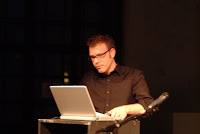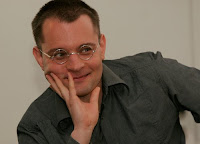From 27-30 December I made the traditional pilgrimage of English faculty everywhere to the annual conference of the Modern Language Association, since time immemorial held between Christmas and New year’s. This year, lucky for me, it was held in San Francisco. Bigger and … well, bigger than ever. Forty-eight concurrent sessions every day, from 8:30 am to 10:30 pm every day.
I spoke about new media and my belief that we need to ditch that term, and expand our attention to a wider range of issues than are currently getting much play in the US, –I’ll upload my remarks shortly. There was a panel on Participatory Education 2.0–quite good; a workshop on evaluating digital scholarship for tenure–grim; a panel on E-literature–contentious and quite a few others as well.
The participatory education panel included remarks from Cathy Davis (Duke) about the HASTAC project (which is aimed more at faculty than students), Howard Rheingold (Stanford) about the set of tools he’s been developing and his basic thoughts. His essay in Joi Ito’s book, FreeSouls captures most of those ideas. And Greg Niemeyer (UC Berkeley) spoke about the Black Cloud project which involves students and schools in measuring air quality in their communities. You can join the project at the main Black Cloud page. This was really a valuable panel more for making me aware of possibilities than anything else. Rheingold in particular has done a lot to integrate technology into his classes in ways that enhance participation and I can see things I shoould do very differently.
The E-lit panel was about “Genre, Form, and Cultural Practice in Contemporary Electronic Literature” and included leading lights from the E-lit scene: Scott Rettberg, one of the editors of the Electronic Literature Collection, Vol. 1, and Sandy Baldwin who directs the Center for Literary Computing at West Virginia University, Maria Engberg who has just finished her PhD but is already well-known for her work on digital poetry, were the main speakers, while John Cayley responded and Jay David Bolter presided over the panel.
The basic question boiled down to “what is electronic literature” and was unresolved. Sandy and Scott had almost opposite views on whether it is better to define it broadly or narrowly. For me the highlight was going to lunch with Maria, Sandy, Jay, my friend Aden Evens and my co-panelist Joe Tabbi afterward, where we could continue the discussion less formally and over some yummy Thai food. 🙂
I’ll write about the tenure workshop later, but for now here’s a link to material organized by the MLA Committee on Information Technology.
There were even a few tweet-ups, but they weren’t as well-organized as might have been, given the technology, and this was complicated by the lack of an open wireless network in the conference meeting rooms. Really I would have thought that would be a given for a huge national conference by now.
Along with attending the conference, I also visited an exhibit on Participatory Art at the San Francisco MoMA and got to hang out with some people I mostly only connect with via Twitter and Facebook, so that was great. More on that stuff later as well.




